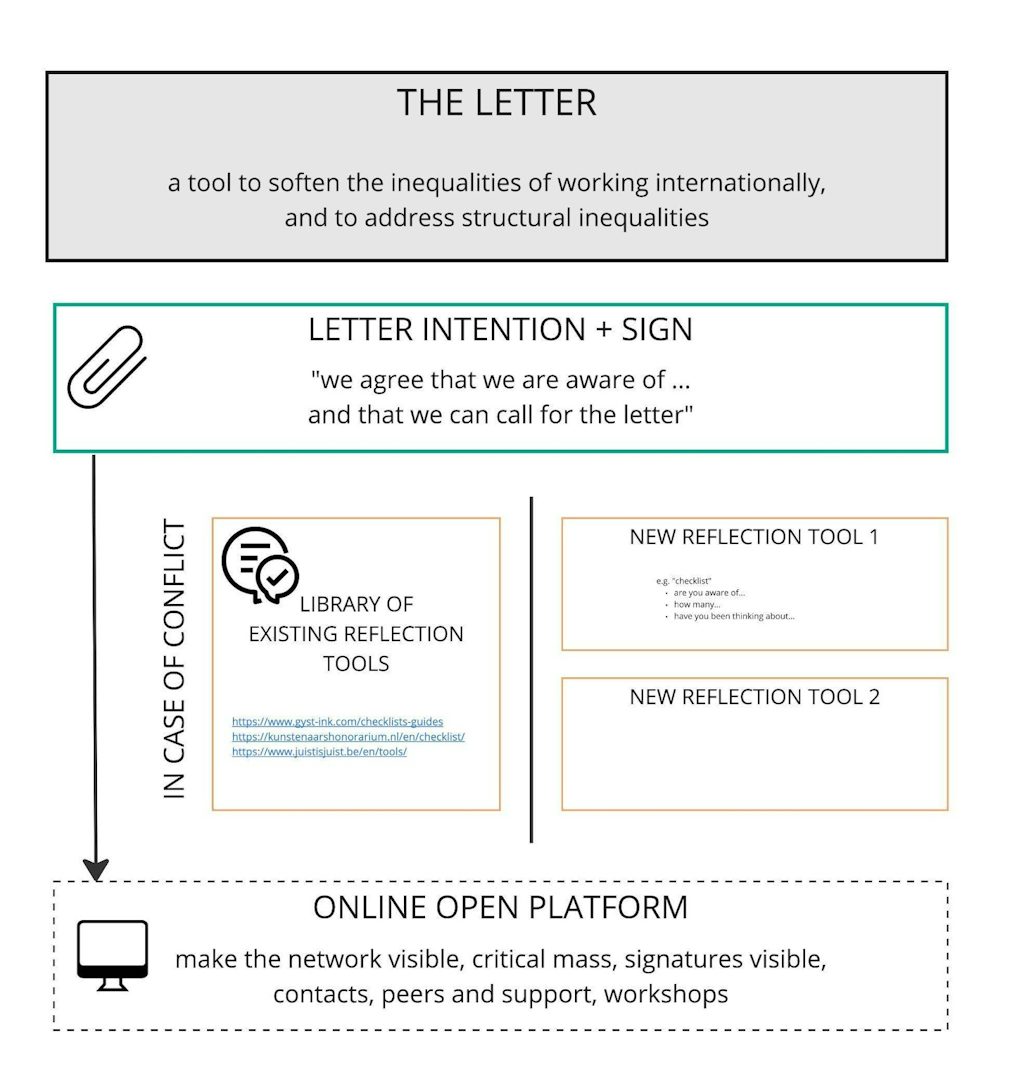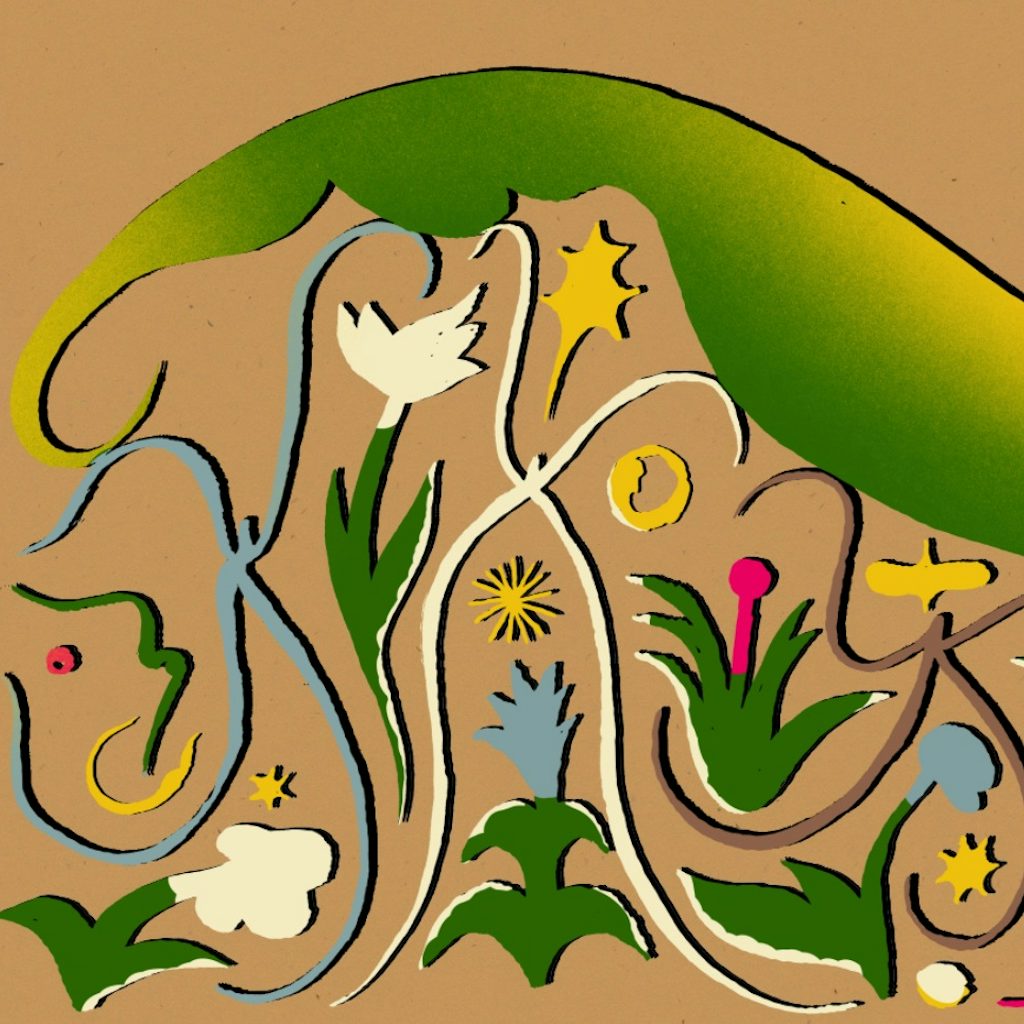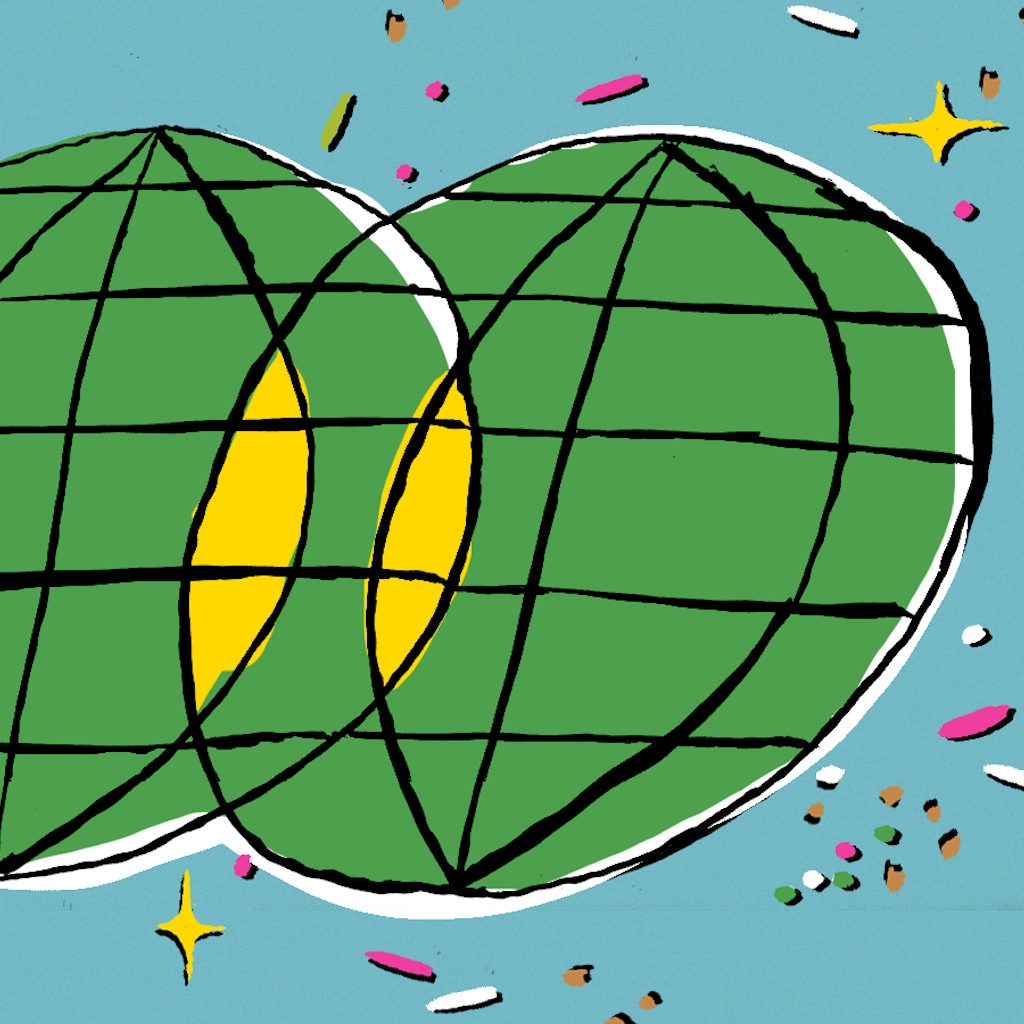A Fair New Idea?! #2: Working internationally – A Letter for Transnational Fair Practice
As well as sharing their experiences and good practices, under the title A Letter For Transnational Fair Practice, Pieternel Vermoortel, Anna Manubens and Yasen Vasilev made an appeal to the international art community to vigorously combat inequalities of cultural, political or financial nature in their international collaborations.
Context – ours and ‘The Letter’
Through this proposal we aim to foreground a trait in the current reality of international artistic working life. Art projects and initiatives created in one country tend to often travel transnationally, as artistic discourse constantly spreads across borders. And when an artist, cultural worker, or artistic initiative, project, or artwork travels and/or is produced across different geographies, they encounter different legal, political, and cultural frameworks. One of the consequences of this is the fact that the attributed financial value of the work and the labour power invested in making the project or building up the initiative, varies depending on the context. Along with the financial value that fluctuates, working principles also vary. As a result, the richness and novelty that artists treasure within this international exchange can be dampened by a clash in working principles and associated remuneration.
We also touch upon the steps that artists take even before their work ends up traveling. And here we’re referring to writing applications for projects and residencies and the energy that goes into these processes, which tends to be hit-and-miss, since a major part of time invested into application writing is never compensated, adding to work overload and frustration.
Getting to know the intricacies of the new context can be a steep learning curve. And in certain situations, such education in context is not available to the artist, cultural worker, or arts initiative making it impossible to access fair working conditions. this configuration leads to a continual sense of re-evaluation, negotiation, and uncertainty, along with material and psychological pressure.
Sure, projects should travel. Access is necessary. But we believe there are better ways to deal with the change in context, ways that rely on solidarity and transparency, care and support cross-institutionally, as well as on an individual level.
It’s with this hope and trust in improving working conditions and knowledge of navigating transnational contexts that we are drafting ‘The Letter’.
We’ve built it up as an instrument that offers a simple, practical, and sustainable starting ground to address and ameliorate inequalities within the current economic framework, while remaining critical and aware of the many layers of issues, diversity and contradictions within the artistic field.
We don’t let these paralyse us, but work through them. We ‘stay with the trouble’ and use ‘The Letter’ as an instrument to contribute to ongoing discussions about viable economic conditions within the arts. We also use it to highlight and work through the nomadic condition of artists and their output, and to question growth-based, production-oriented economic models, which are the bedrock of the impending climate crisis and something we should learn to fight against, given the urgency of the topic.
‘The Letter’ ultimately emphasises the importance of care for the individuals making up the artistic field, and maintenance as well as repair for the bureaucratic structures that keep those individuals moving safely and mindfully.
Working with ‘The Letter’
We propose an instrument that can be used to build a community of cultural workers and institutions that both discuss and tackle the inequalities within the artistic working field. We call this instrument ‘The Letter’.
‘The Letter’ poses questions, offers the possibility to discuss and negotiate, and makes up a virtual space in which a process of awareness of inequalities reached through discussions, learning, and change can take place.
When using ‘The Letter’, its main goal is to contextualise issues and discuss their structural dimension. An additional goal is to offer artists, cultural workers, and institutions the chance to reach out to one another and open up a conversation with other signatories.
A first version of ‘The Letter’ is attached and ready to be put to work in building community, with the understanding that this is a living document that can also be adapted to the needs of the community where it is used.
Other reflection and ethical standard instruments that inspire ‘The Letter’ itself and which can be added to ‘The Letter’ can be found on:
- gyst-ink.com/checklists-guides
- kunstenaarshonorarium.nl/en/checklist
- juistisjuist.be/en/tools
- fairpracticecode.nl/nl
This list is not exhaustive and can be adapted locally and internationally by adding initiatives on fair working conditions…
Practicalities
‘The Letter’ can be signed by artists, cultural workers, and institutions, affirming their commitment to good working practices and agreeing to be a part of a network of learning and exchange.
‘The Letter’ can be used in a preliminary conversation or attached as an appendix to a contract, at the start of a collaboration, to make sure that both parties will be following its principles for fair practice and ethical standards.
A webpage within The Flanders Art Institute website will make ‘The Letter’ public and the community around it visible. Every arts organisation signing ‘The Letter’ in the context of collaborating with artists and cultural workers shows its support towards fair working conditions. Thus, ‘The Letter’ unites a network of people that deal with and think about similar issues and are willing to share their experience to tackle them. We are looking forward to ideas, terms, and conditions on how to realise this. Signatories can, for instance, be contacted to provide specific input on a matter that lies close to their expertise. For this purpose, their expertise or affiliation should be included when signing ‘The Letter’.
First version of ‘The Letter’
1. The needs and rights of artists and cultural workers are a public issue
This is the principle on which working solidarity is built – the idea that our working conditions are not private matters, but issues we should share between ourselves within the field, and make transparent. Things such as: hourly rates, working hours, production budgets, time off, issues of mindful travel, and inclusivity and diversity, which all contain an inherent political dimension.
The terms and conditions under which an artist or cultural worker agrees to contribute their work to a public process or display should not rely on their will, availability, and energy when negotiating. There should already be structures in place to protect the artist or cultural worker
We, the signatories of ‘The Letter’, insist that hosting institutions should take responsibility for finding a way to preserve the needs and rights of artists and cultural workers. If a solution to better support a specific project may sometimes translate into committing to do less overall – adapting the physical or temporal dimensions of the work – we agree that this is a preferable solution, rather than stretching resources thin or overworking, which may lead to burnouts and precarity.
Questions to reflect on together at the start of the collaboration:
Are institutions raising, sustaining, or undermining the working standards of the artistic field they’re operating in?
Are the working standards of the artistic field made properly transparent to the artists and cultural workers developing a project within an institution?
Is an artist’s or cultural worker’s vulnerability a personal issue or a collective one?
2. A network of partners strengthens collective imagination
We, the signatories of ‘The Letter’ strongly believe in the strength of collective imagination. We encourage the creation of a support structure around a travelling project, artist, or cultural worker. We are aware that ‘working internationally’ is not only a way to describe the fact that a project, an artist, or a cultural worker travel. It also implies the creation of a network of partners that have the potential to become a safety net. Through this, we believe projects that travel don’t just have one moment of display, but have future ramifications in terms of working relationships.
When looking for ideas to work together mindfully, the network created by the project can step in and be supportive.
Any institution working internationally within the field of culture in any phase of development of a project could reach out to the rest of the institutions that are directly or indirectly concerned with the same topic in order to find creative and collaborative solutions to uneven terms and conditions.
Questions to reflect on together at the start of the collaboration:
Do we agree to reset the value of the same project simply because it is presented in another context?
Do we accept that an artist or cultural worker should forfeit building up social security rights in a different national working environment?
Do we know of or can we imagine an institution where care for the artists and cultural workers comes first and productivity and results come second?
3. Fair working conditions need context-specific answers
We, the signatories of ‘The Letter’, want to understand transnational working conditions in a way that allows us to handle them instead of being overwhelmed by them. We want to understand the context in which they are created. We are aware that it is impossible and even not desirable to set standards that would be imposed on all scales and locations. There is no ‘one-size-fits-all’ solution that we’re aiming for.
Universally intended solutions are top-down, not mindful of local realities and they end up practicing biased and exclusionary ways of working. If there’s a way to find an agreement on how to soften the randomness of international payments and conditions, it is by understanding that there are no systemic solutions, but fairer conditions can be established in a context-sensitive manner.
Questions to reflect on together at the start of the collaboration:
How many iterations of this project – with this duration and for this money – would be needed to make living/life sustainable for the artist over a year, considering the context the project is displayed in?
Are artists coming from other national contexts uplifting or undermining local working conditions?
Are they even aware of what those local conditions are? What would be needed to allow them to be more aware?
DATE AND SIGNATURES
name + and/or institutional affiliation + specific expertise
By adding your signature to ‘The Letter’ you are:
- affirming your commitment to fair working practices;
- supporting the possibility of working with ‘The Letter’: as an annex to a contract, or as a starting point for discussion with a freelance artist or cultural worker and/or during a workshop on fair working conditions;
- agreeing to be a part of a network of learning and exchange;
- sharing your contact details within the community of signatories, and allowing the possibility to contact, or be contacted, about specific experience and expertise;
- considering the possibility of making a new version of ‘The Letter’, or tools that may arise from it, which can be uploaded on the website of Flanders Arts Institute.
Credits
- written by Anna Manubens, Yasen Vasilev, Pieternel Vermoortel
- edited by Maarten Soete, Alina Lupu
- proofreading by Leo Reijnen
- Published in the context of A Fair New Idea 2, Sustainability and International Collaboration in the Arts





